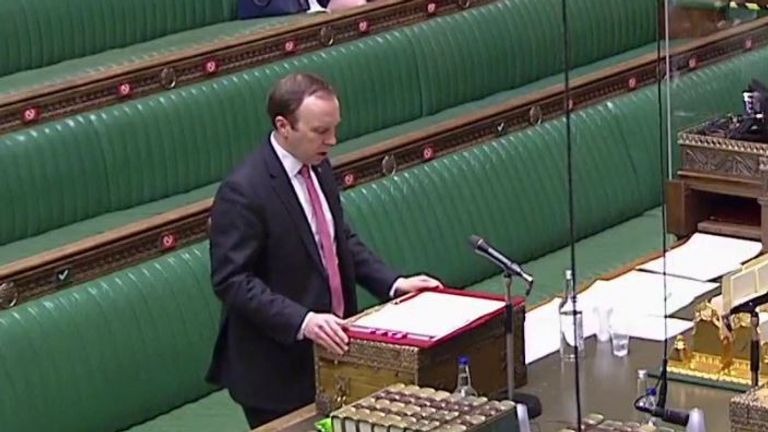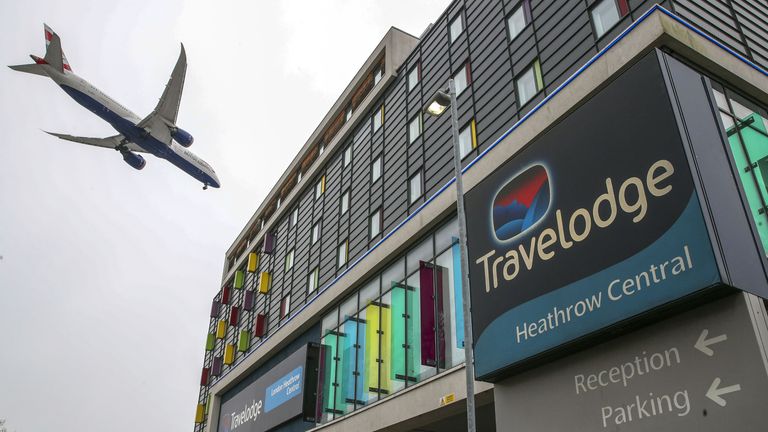From next week, new UK border measures will come into force as ministers act to prevent the possible import of COVID variants.
The UK government has been taking advice from officials in Australia over the fresh restrictions – a country that has been widely praised for its response to the coronavirus pandemic.
The new action has been prompted by fears that COVID variants, which could possibly be more resistant to vaccines, might enter or grow more widespread in the UK at a time when the vaccine roll-out is being expanded.
Health Secretary Matt Hancock described the need to respond to new variants as “mission-critical to protect ourselves for the long term”.
So, what are the new measures?
Hotel quarantine
From 15 February, UK and Irish residents arriving in England who have been in “red list” countries in the previous 10 days will need to quarantine in a hotel room for 10 days on their arrival.
They will have to book online through a dedicated portal in advance and pay for a quarantine package, which includes assigned transport to their hotel, COVID testing and food and drinks.
The charge for a single adult will be £1,750 and the government has booked 4,600 rooms across 16 hotels.
Fines from £5,000, rising to £10,000, will be issued to arrivals who fail to quarantine in a designated hotel.
Passenger Locator Forms, which are already required for presentation at the UK border, will now also not only have to detail a passenger’s travel journey but also their quarantine and testing package.
What is a ‘red list’ country?
There are currently 33 countries on the UK’s travel “red list”.
These are countries from which only British and Irish nationals, or third country nationals with residence rights in the UK, will be able to enter the UK.
If you do not have residence rights in the UK, you will be refused entry at the UK border if you have been in one of the “red list” countries in the previous 10 days.
The 33 countries currently on the UK’s “red list” are:
Angola, Argentina, Bolivia, Botswana, Brazil, Burundi, Cape Verde, Chile, Colombia, Democratic Republic of the Congo, Ecuador, Eswatini, French Guiana, Guyana, Lesotho, Malawi, Mauritius, Mozambique, Namibia, Panama, Paraguay, Peru, Portugal, Rwanda, Seychelles, South Africa, Suriname, Tanzania, United Arab Emirates, Uruguay, Venezuela, Zambia, Zimbabwe.
Anyone attempting to conceal that they have travelled in a “red list” country could face a £10,000 fine or prosecution and up to 10 years in prison.
What if I’m not arriving from a ‘red list’ country?
If you are arriving in England from a country that isn’t on the UK’s travel “red list” you will not have to quarantine in a hotel room.
However, you will have to complete a 10-day quarantine period at home.
COVID testing
Currently, everyone arriving in the UK has to show proof of a negative COVID test result from up to 72 hours before their journey.
The testing regime for those coming from abroad is now being expanded, with all arrivals now having to undertake two mandatory PCR tests – on day two and day eight of their 10-day quarantine period.
Tests must be booked by passengers from a list of government-approved providers, through an online portal, before their journey to the UK.
If either of these post-arrival tests is positive, they’ll have to quarantine for a further 10 days from the date of the test
Any positive test will be sent for genomic sequencing to confirm whether they have a variant of concern.
Subscribe to Sophy Ridge on Sunday on Apple podcasts, Google podcasts, Spotify, Spreaker
The existing “test to release” scheme, which allows people to exit home quarantine if they test negative after five days, can still be used in addition to the two mandatory post-arrival tests.
However, this scheme cannot be used if you are arriving from a “red list” country.
A £1,000 fine will be handed to any arrival who fails to take a mandatory test, followed by a £2,000 fine for anyone who fails to take the second mandatory test.
This will be accompanied by an automatic extension of the quarantine period to 14 days.
Are these UK-wide measures?
The rules will be slightly different in Scotland, where all international travellers arriving directly on flights will have to enter quarantine hotels.
However, the Welsh government has said it will put in place the same arrangements in Wales as the UK government is doing for England.
Mr Hancock said the government was working with the Republic of Ireland to put in place “a system that works across the Common Travel Area”.
This would help close a possible loophole that could allow people to avoid border measures by travelling to the UK via the Republic of Ireland.
Over three nights Sky News will host a series of special programmes examining the UK’s response to the pandemic.
Watch COVID Crisis: Learning the Lessons at 8pm on 9, 10 and 11 February.






